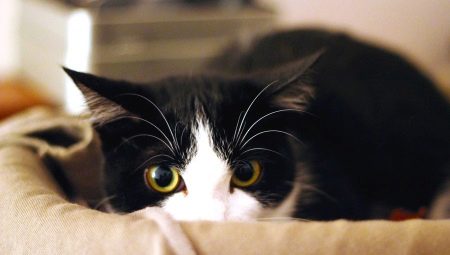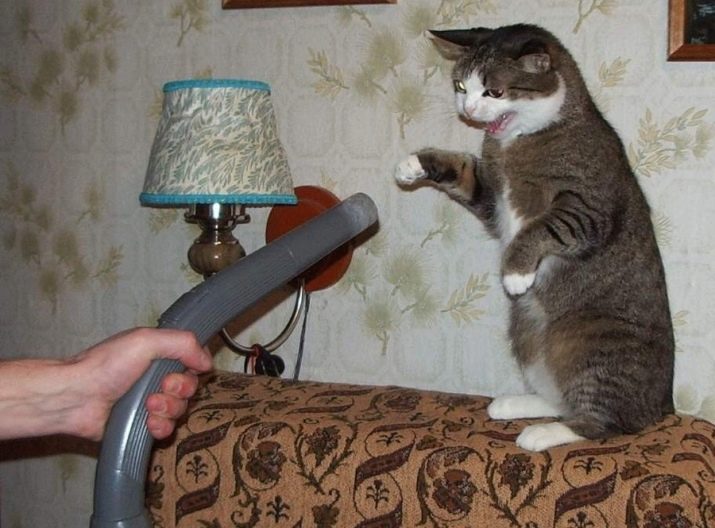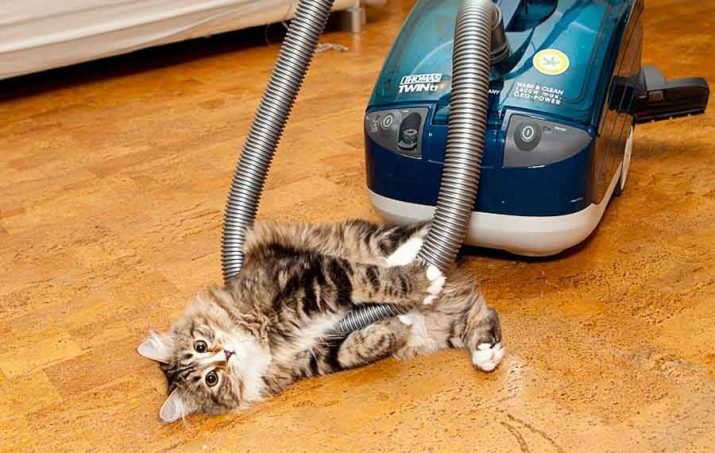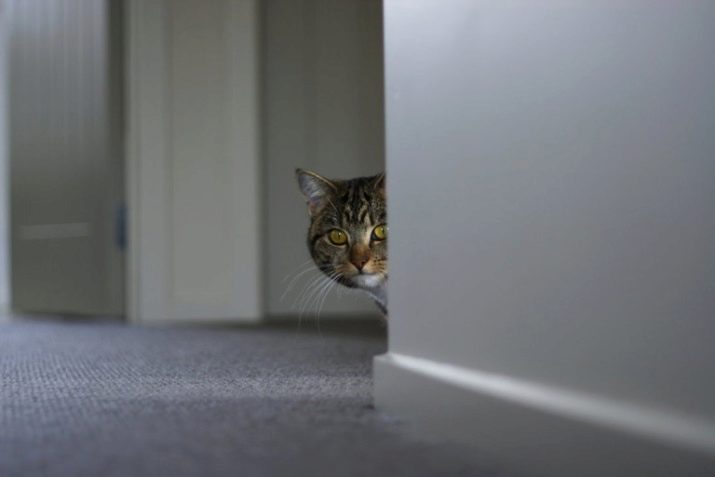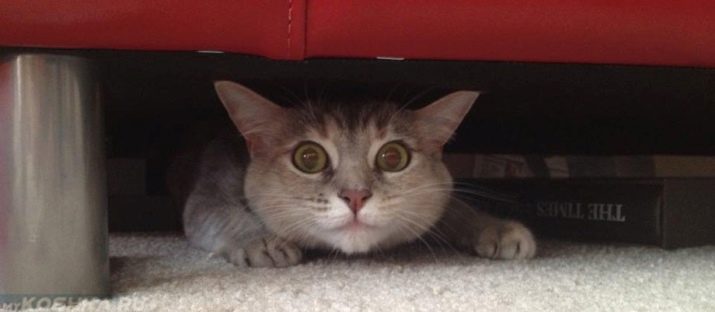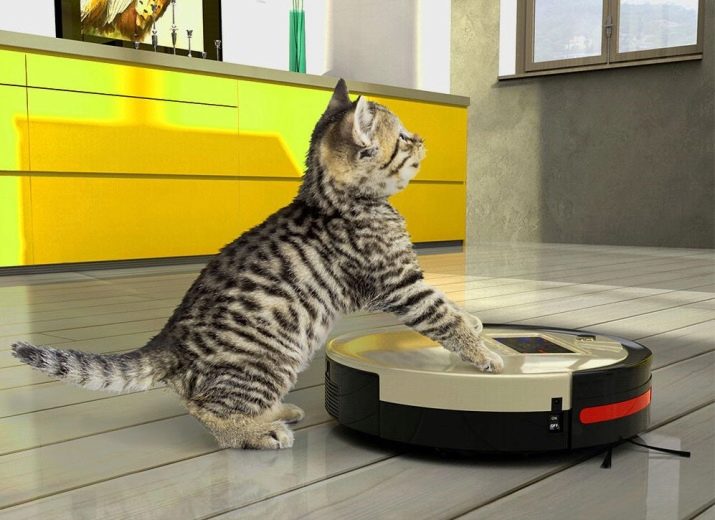Surely you noticed that your cat does not share the master's passion for many household appliances. Mixers, food processors, hair dryers, fans, but a separate line, of course, is the most terrible, booming and formidable unit in the house - a vacuum cleaner. Why is he so scared of fluffy pets? And what can be done to keep the animal calm and the house clean?
How do you know if your cat is scared?
The pet will make it clear by its behavior that it is very agitated. Here are signs that speak eloquently about it:
- wool stands on end;
- pupils greatly dilated;
- the animal is trying to hide in a hard-to-reach place;
- the cat hisses or meows loudly;
- trying to scratch or bite the owner if he wants to take the animal in his arms.
Causes of complex relationships of cats and vacuum cleaners
There are several reasons why pets try to hide at the slightest sign of a formidable enemy.
- Noise. Agree, if next to you a train flies or a plane flies, you will feel it. But since you know that transport is not dangerous, you will not hide under the sofa. For cats, the noise level emanating from the vacuum cleaner exceeds the level of calm and comfort, so the animal reacts negatively to the equipment and tries to get away from the object as far as possible. The included vacuum cleaner operates at a frequency of 80 decibels, this causes a strong vibration of the eardrums of the animal, and with it, painful sensations. Often pets become disoriented.
- Vibration. Cats can not only hear, but also capture vibrations. There are special receptors on the legs that help the animals to fix changes in space and feel even small fluctuations. The vacuum cleaner vibrates quite strongly and intensely, this causes the animal to react to what is happening. Often the right decision is to get as far away from the source of vibration as possible.
- Fear of an unknown subject. Surely you do not clean the apartment every day. And most likely, the vacuum cleaner does not stand in the most prominent and honorable place in your house. Most of the time, the animal does not collide with the machine, so rare and sudden encounters make the cat nervous.
- Some cats see a contender in the vacuum cleaner rather than a life-threatening unit. You may have noticed such animals that remain in the room with the car, reared, put the tail with a pipe and even try to attack the source of unrest, despite the fact that the cat is very scary. Pets perceive the movement of the machine as an encroachment on their territory and are ready to defend their rights to the land.
- In rare cases, the cat is afraid of a vacuum cleaner, the owner himself is guilty, who decided to clean the floor, not just the floor, but also a fluffy pet. Of course, such actions can not please the cat. If you are having fun at this moment, the animal feels fear. No wonder that at the next meetings it will prefer to get out of the sight of an unpleasant aggregate in advance.
Another problem that experts point out more concerns the owners of old models of vacuum cleaners. During operation, they not only suck up the dust on the carpet, but also raise it. Small particles irritate the animal's mucosa and interfere with normal breathing.
If you notice that the cat starts to sneeze during the cleaning, most likely, the dust raised in the air will be the fault.
How can you solve the problem and teach your pet to noise?
It is best to do this while your kitten has not yet grown. It will be more difficult to re-educate an adult animal. The first thing to do: more often leave the broken unit in a prominent place so that the animal can get used to its presence.
Some training experts recommend putting the vacuum cleaner closer to the bowls of food and water. Of course, it can not be included in any case. The pet should get used to the presence of a stranger. After some time, you can start cleaning the room, without moving the bowl, and at the same time put delicacies to lure the pet. Soon the cat should get used, including to the noise.
If you are unable to reconcile the two camps, do not insist on such friendship. Do not force the cat to remain alone with the machine in the room; in no case do not lock the animal with the machine running.
Take care of your pet's nerves. Realize that it is difficult for him to understand that a big noisy car does not threaten his life.
What to do if you can not make friends with a pet and a vacuum cleaner?
We offer you several options for solutions, and which one to choose - each one determines.
You can put up with and during cleaning to provide pet space for maneuver and departure. Some send the cats to walk to the balcony or temporarily close the kitchen, at the same time muffling the noise with the help of the closed door. If you have a kitten in your house, it is better to have a person with him at that time. A small beast is easy to scare for life, and it is absolutely not necessary.
There is another option, to which pets are treated with greater tolerance and even derive their own benefit from it. Use a robot vacuum cleaner. It produces much less noise and vibrations. It is compact and will not scare the cat with its size.
Surely you come across a video where pets are happy to ride around the house, riding such vacuum cleaners. This is a very convenient option also because your own hands will be free for more important things than cleaning the house, and the cat will amuse you with funny tricks.
About what the cats are afraid of, see the next video.
